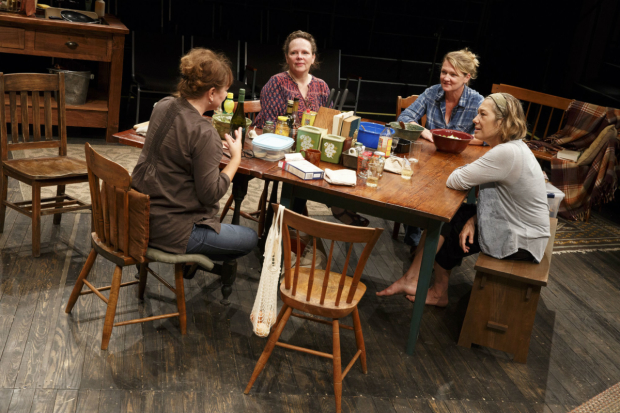Review: The Gabriels: Election Year in the Life of One Family (Attenborough Centre)
Richard Nelson’s trilogy, running as part of the Brighton Festival, is an unforgettable experience

Richard Nelson's triptych of plays about the imaginary Gabriel family feels like a theatrical miracle. With the simplest of ingredients, it conjures an entire world in front of your eyes and fills it with teeming life. It is both utterly truthful and a construct of artifice. I think it is one of the loveliest and most profound things I have ever seen.
Each 105-minute play – Hungry, What Did You Expect?, Women of a Certain Age – is set (and was originally performed) on a significant day in the 2016 US presidential campaign. The final play actually opened in New York on the night Donald Trump was elected president. Neither actors, characters (all Democrats) or the audience knew the result, although the reasons for his victory are prefigured with remarkable prescience in plays which describe the terrible sense of dislocation running through American life.
Each play opens with the six-strong cast walking on stage and creating the set – down to the photographs on the fridge – of an ordinary kitchen in the Gabriels' family home in Rhinebeck, a village 100 miles from New York where Nelson, writer and director, also lives. Each revolves around the cooking of a meal, and concludes with the family leaving Mary Gabriel alone.
She is poleaxed by grief and anger at the death of her husband, Thomas, a playwright, whose ghostly presence is always in the room as his brother George, sister Joyce, mother Patricia, first wife Karin and sister in law, George's wife, Hannah, gather to remember him and sort out the messy business of their lives. They are stalked by debt, and by a sense that their values, based around community roots, honest work, and trust in humanity, are being eroded by a new world order driven by greed and money. "When you're scared, you're vulnerable," says George of the way his mother has been tricked into parting with money. But it could describe every one of the characters."Why do I feel like I'm a stranger in my own country?" Mary asks, quoting her husband.
Seeing the plays together in a single, absorbing day, the tightness of the structures that bind them are clear. Each play, for example, has a historical anecdote at its centre: a story about Eleanor Roosevelt in the first, a tale about a picnic shared by Nathaniel Hawthorne and Herman Melville in the second, memories of the young firebrand Hillary Clinton, attacking corporate culture in the third. "Where is this Hillary?" asks Hannah, sadly.
Themes – the dispossession of the young, their alienation from their dreams, the solidarity of women – and even images – buzzards circling the corpses of the downtrodden – also recur. And Nelson, clever playwright that he is, is entirely aware of all he is doing. Through the remembered quotations of Thomas he expands his own view of writing as a communion between audience and actors, a way of understanding people by looking and listening very hard.
But what is so extraordinary and so moving about The Gabriel trilogy is that the actual experience of watching the plays embodies this theory. Because nothing seems to be happening, except a family coming together and making a meal, the audience leans forward to listen, intently picking up every word. As each play progresses, it is as if you become part of the family, sharing their hopes and fears, laughing at their jokes (the plays are extremely funny) and admiring their stoical refusal to give up or be bowed down.
They embody the empathy they preach thanks to performances that go so far beyond naturalism that you feel the actors are just living the lives they are imagining. They have a detail of look and gesture that makes them utterly believable as individuals and as a group. Just the way Jay O Sanders as George juts his chin, or clenches his jaw when he is angry, or looks at his sister when she finally holds their mother, speaks as many volumes as the eloquent, overlapping dialogue.
As Karin, the intruder in the nest, (there's a great running joke about her continued presence) Meg Gibson is all nervy energy; Roberta Maxwell conveys just the right mixture of confusion and defiance as the mother (the scene where everyone watches anxiously as she attempts to cut an apple is a sharply-observed gem); Amy Warren projects the wary defensiveness of a child who believes she is always left out.
As George's gentle but powerful wife Lynn Hawley taps reserves of long-suffering patience and kindness, knowing he is giving away their lives too cheaply but reluctant to damage his goodness by stopping him. And as Mary, Maryann Plunkett gives a performance of such essential rightness, her every word strikes a profound, emotional chord. Even when silent, she has the capacity to make you want to cry.
In the end, a day with the Gabriels is not a depressing thing, however. They are survivors, jumping across the abyss, with love and hope in their hearts. As an audience, the amount you care about them is a tribute to the power of theatre itself. It really is nothing and everything, a story and an entire world. Unforgettable.
The Gabriels runs at the Attenborough Centre as part of Brighton Festival until 27 May.













